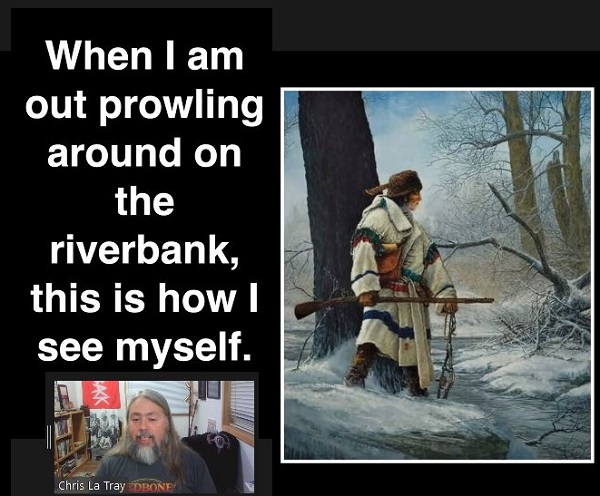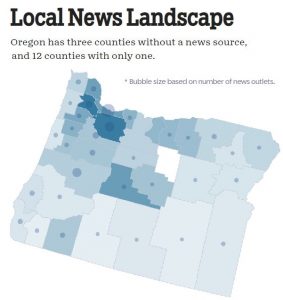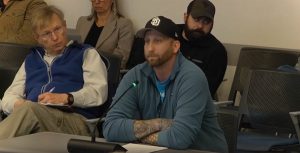Chris La Tray talks about his upcoming book
8 min read
From Frenchtown Montana, the writer Chris La Tray talks about his forthcoming book.
[00:00:04] Chris La Tray: It’s going to be out next year, it’s in manuscript form right now. It’s about the Little Shell Tribe.
[00:00:11] There’s been a concentrated effort towards erasure of our people, and just the lack of interest by the colonial powers to document so much of our story…
[00:00:22] The story of the Little Shell is the story of many people that’s played out differently, but with similar results, similar struggles, similar triumphs, similar long-game efforts to achieve a kind of recognition that should never be denied anybody. But so many of us face situations where they are denied.
[00:00:46] We can’t talk about the Little Shell without talking about the Métis, which is what I tend to identify as. So Métis is French for mixed blood or mixed. If you see it with a small ‘m’ then you’re literally talking about the French word for mixed. But if you see it with the capital ‘M’ you’re talking about the Métis people who are a unique cultural group recognized in Canada, but not in the United States.
[00:01:12] John Q: He offered a quick history of the colonization of North America.
[00:01:17] Chris La Tray: The Métis kind of evolved out of relationship with primarily the Hudson’s Bay Company.
[00:01:23] A third of what is Canada today was controlled by the Hudson’s Bay Company, and the initial traders who came over, largely from the eastern side of the Great Lakes region, French, mostly with some Welsh and Scottish and English traders, there weren’t that many of ’em to begin with.
[00:01:43] So in order for them to survive, living in this hostile environment, and to create trading relationships with indigenous people who had a vast trade network and their own rules for how trade would be conducted. Some of those rules are you could only trade with family.
[00:02:01] So the first thing that these traders did is they married into indigenous families and the result of those marriages, the children, became mixed blood, became Métis, and that is the genesis of the Métis people.
[00:02:18] The Métis people are, you know, blessed with living in two worlds, the best of our indigenous heritage and the best of the European influence and we took those things for ourselves. That’s what makes us unique, is that we’re this blend of two totally different worlds.
[00:02:37] We had our own language called Michif, which like English is essentially a trade language. So Michif was primarily French and some Welsh nouns mixed in with a whole lot of primarily Cree or Ojibwe verbs. The indigenous languages are much verb-heavier than our European languages, and so what Michif, the problem it solved is, that there were enough mixed-up words among the tribes and the traders and everything that you could kind of have a conversation.
[00:03:07] The Métis invented the Red River cart, which is considered to be the first instance of wheel use on the northern plains by indigenous people. So there weren’t wheels in Indian country pre-early-1800s and people say, ‘Well, you guys are a bunch of primitives. Why didn’t you have the wheel?’ But we didn’t need the wheel ’cause until we moved out on the plains, we were a lake and river people. And we had this marvel of technology called the birchbark canoe that we used to transport loads, heavy loads, and travel through these vast lake and river systems. So it wasn’t until we went west and needed a different means to travel that we invented the Red River cart.
[00:03:50] John Q: If you ever hear of a French Canadian guide, that was a Métis.
[00:03:54] Chris La Tray: We developed a life on the land as hunters. We were guides. There were, at any given time, six to eight Métis guides on the Lewis & Clark expedition. David Thompson, he was a big-name explorer with Métis guides. The Mullan Road, John Mullan, Father Pierre De Smet. These were all people that, to do what they’re so well known for now, could not have been done without Métis guides.
[00:04:20] John Q: Chris said federal agents did not always act in their best interest.
[00:04:24] Chris La Tray: Post the formation of the Métis culture, the Métis people, we have the Stevens Expedition of 1853. Isaac Stevens, part of his mission west was to map, survey a route for the railroads. So Stevens has an infamous history and at Council Grove in 1855 is where Stevens negotiated the Hellgate Treaty, which (in short) stole all of the land in the Bitterroot Valley from the Salish people and moved them, forced them north.
[00:04:59] For us Pembina Chippewa, the Treaty of Old Crossing of 1863, which happened in Minnesota one year after the Dakota War—where the Governor of Minnesota, when we gathered for the Treaty of Old Crossing a year later, was still offering bounties on indigenous scalps.
[00:05:17] 1863 is when I set the date for when things really started to unravel for what ultimately become the Little Shell people. One of the big problems is Isaac Stevens, who was supposed to come back and negotiate treaties with us, ’cause nobody knew what his plan was for dealing with all of these other tribes, so he gets killed in the Civil War.
[00:05:37] A few years after the Civil War, the United States in 1871 says, ‘You know what? We’re not going to treat Indian nations as actual sovereign nations anymore, which means we’re not going to sign any more treaties that we would break anyhow.’ So there’s no more treaties after 1871.
[00:05:53] The buffalo herds are already disappearing. And as the herds dwindled, those resources were smaller, so the family groups were smaller. All of this is happening in the same place, in the central plains and up into southern Canada. Just all of these people coming together and just smashing together and everybody wanting everything for themselves. All of this is the beginning of the diaspora of the Pembina Band of Chippewa.
[00:06:21] And all of these people are moving here and our Métis settlements on the Milk River, we get burned out of them twice, and then the feds come along in 1882 and they squeeze the Pembina Chippewa down to that tiny little postage stamp in 1882. You know, they had houses and things too that, you know, by the time they got to the end of the driveway, there was a white family, all with their luggage, ready to move into that house.
[00:06:47] They didn’t hew their cabins with their bare hands. A lot of them were already hewn for them by the people who were there first who weren’t allowed to stay there, driven somewhere else, and settlers moved in. Not all of them, but enough of them.
[00:07:02] John Q: The McCumber agreement took away the Little Shell land.
[00:07:06] Chris La Tray: Porter McCumber was basically a federal bureaucrat who saw nine million acres of gorgeous land that he wanted. McCumber talks to the Indian agent and says, ‘I need you to pick some representatives from the Pembina who will play ball with us.’
[00:07:23] So that’s what he does. John Waugh, he finds 32 chiefs, 16 full-blood Chippewa and 16 Métis and identifies them as chiefs. So McCumber comes to negotiate this land purchase and the only people who are allowed to speak are these 32 representatives, and they buy the land for 10 cents an acre. And there are still lawsuits in the courts going back to the Ten-Cent Treaty of 1892 in our court system today.
[00:07:59] Those 32 guys and Waugh and McCumber made a list of who was willing to play with them and a list who wasn’t. And just like that, anybody who wasn’t on the list became landless Little Shell and we were disenrolled. We didn’t belong to the tribe that we had been part of for hundreds of years, and that is when we became the landless Indians.
[00:08:21] So we just lived on the fringes. There were communities all around every city, areas called Moccasin Flats or Buckskin Flats or Breedtowns, where we lived near garbage dumps and slaughterhouses, any place that we could scavenge together a life because we weren’t allowed to do anything else.
[00:08:44] And you can find newspaper articles from the time and just the horrible racism against the dirty Indians and the half breeds and the breeds and all of these names that we were referred to as during this time period when everything that we had had, had been taken from us.
[00:09:01] So this is the Métis Archipelago that I grew up in without knowing it, all of these communities all over Montana that in many cases were established by Métis people.
[00:09:12] Frenchtown was founded by Red River Métis people in the late 1850s. And that’s where I grew up. And there were all these family names of Deschamps and Cyr and Lucier and half a dozen other ones that are all old Métis family names. So I grew up in a community of people that were all culturally related and none of us knew about it.
[00:09:37] And why did none of us know about it? Well, cause the only people who could talk about it weren’t, or the people who could have told them died before they could be told.
[00:09:47] 1916: Rocky Boy gets established, early ‘20s is when the first official efforts to do something. We were called ‘the abandoned Chippewa Indians’ at that time. The appeals to the government, trips to Washington D.C., all of these efforts to try and get recognition, the gathering of documentation, is happening in the ’20s. That goes on for 50 years.
[00:10:08] In 1978, United States finally decides we need to figure out a way to deal with all these people and established a means for the unrecognized tribes to get recognition, and that’s when those folks in the ’20s who started organizing organized us as the Little Shell. 2019, we ultimately got federal recognition.
[00:10:29] John Q: How can the Little Shell reconnect to their ceremony and spirituality?
[00:10:35] Chris La Tray: There are people (like me) who have decided to learn, and we have people that are working to reestablish our Anishinaabe cultural values.
[00:10:47] It’s a generational process. So whatever comes from federal recognition and our efforts now to kind of rebuild who we are as a people, I’m not going to see that. And my son probably isn’t going to see that, but if we do things right, my grandchildren are going to see that, our grandchildren, our great grandchildren.
[00:11:10] All of this…it’s a long game.
[00:11:13] Another indigenous guy was interviewed, I think he’s Ponca: ‘What’s 500 years? Indigenous people have been here since time immemorial. This is going to pass, and Indians are still going to be here.’ So no matter what we do, Indians are going to be here and the land is going to be here and everything that made us indigenous with the land and connected to the land, we didn’t lose it. We just got disconnected from it and we will be reconnected to it.
[00:11:43] John Q: From Frenchtown Montana, the writer Chris La Tray. Pre-order his upcoming book on the Little Shell and check out more of his writing at ChrisLaTray.com.







